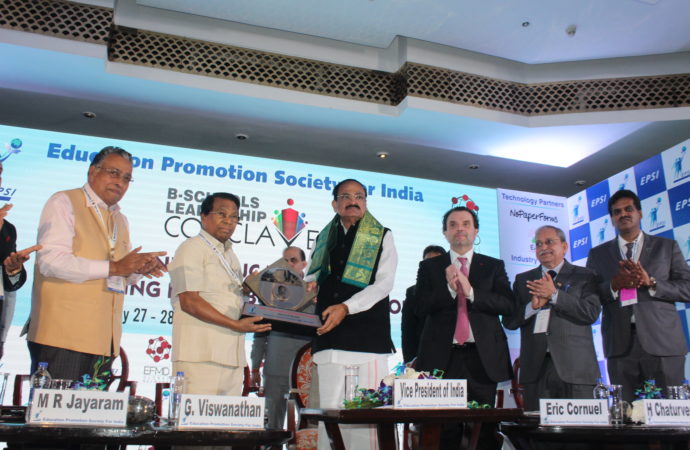Vice President of India, Venkaiah Naidu yesterday underlined the need for public private partnership(PPP) to boost quality education.
Confessing that the business education in India is on the verge of a paradigm shift, Vice President of India, Venkaiah Naidu yesterday underlined the need for public private partnership(PPP) to boost quality education for business. He was speaking at inauguration of EPSI B-school Leadership Conclave at The Claridges, New Delhi yesterday. This conclave will be held till 28th February and is being conducted with a central theme ‘Business Education 4.0: Futurising Indian Business Schools.’
The guest of honour at the inauguration was Prof. Eric Cornuel, Director General and CEO, European Foundation for Management Development (EFMD). The other dignitaries included Dr G Viswanathan, Founder & Chancellor, Vellore Institute of Technology (VIT), Dr M R Jayaram, Chairman, Gokula Education Foundation, and Dr H Chaturvedi, Alternate President, Education Promotion Society for India.
Emphasising the need for usage of technology in classrooms Vice-president Venkaiah Naidu said, “We cannot depend on conventional teaching, we have to shift to innovative teaching pedagogies like case studies, simulations, open online courses such as MOOCs, use of technology like laptops and mobiles, and disruptive technologies such as AI in classrooms. However, almost 20 per cent of the Indian population is still illiterate. This calls for an urgent action in addressing illiteracy, especially in rural India.”
Stating that we Indians should revive our outlook towards business, the vice-president praised the role of some leading B-schools like XLRI, Narsee Monjee, BIMTECH, XLRI etc in making this change happen. He also told that organisations should be run with ethics and family businesses have the most important role to play in it. He further added, “Business schools should include case studies of successful family businesses as a part of their curriculum. We should adopt already existing business models and develop our own model that would suit Indian ethos. At the same time, business schools should also impart strong business ethics and morals in their students.”
Prof. Eric Cornuel, Director General and CEO, European Foundation for Management Development (EFMD) added, “Business education today is more entwined with the world’s socio-economic situation be it globally, economic inequalities are on a rise and middle-class is rapidly shrinking. We need to ask if traditional education is enough to make the youth employable.” Dr G Viswanathan, Founder and Chancellor, Vellore Institute of Technology (VIT) and a renowned educationist emphasised the need to educate underprivileged girls and added, “Education is an important subject for any developing economy but unfortunately not for us. It is time now that we offer free education to all. We can start with free education to girls.”
The first plenary session included discourse on development of new skills, jobs, and new curriculum to prepare students for tomorrow’s future. The other sessions included discussions on transforming the learning experience and maximising the use of technology in business education. On the second day, regulatory policies for developing future B-schools will be discussed. The plenary session on 28 February will discuss regulatory policies in developing futuristic B-school in India.


















Leave a Comment
Your email address will not be published. Required fields are marked with *